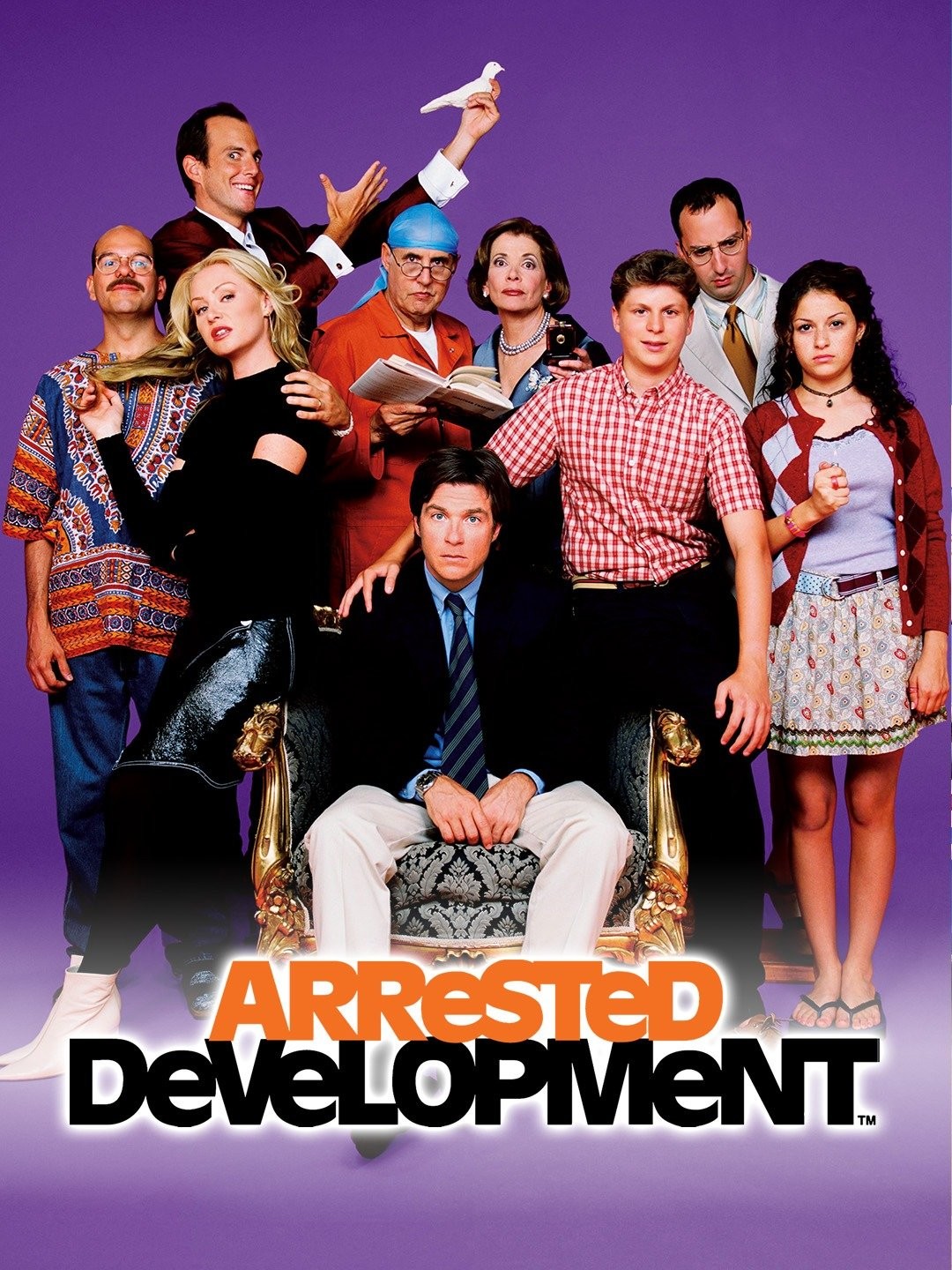Beginning in the early-mid 2000’s was a budding trend for comedic television, defined by a format that poked fun at reality television to help highlight the absurdity of characters and scenarios. The genre—which would soon be defined by its all-star participant The Office after 2005—would fall under the title of “mockumentary.” While the term mockumentary wasn’t created during this 2000’s boom, some of the most well known members of the genre began during this span. Interestingly, one hit the American scene rather early with a unique identity in its execution, being the 2003 show Arrested Development. Starring Jason Bateman as Michael Bluth, Arrested Development is a series presented as “the story of a wealthy family who lost everything, and the one son [Michael] who had no choice but to keep them all together,” all told by a narrator speaking in past tense. While The Office has an in-the-moment crew who would occasionally interview the characters, the narrator and cameras following the Bluth family in Arrested Development goes against the possible notion that they’re just there to simply restate what’s happening. Instead, the narrator cements himself as a key component of both the Bluth family and the strong writing that makes the series such a great piece to revisit. So, what does the narrator uniquely contribute to the show, and what reality or realm does the mockumentary crew inhabit while filming the Bluths?
Narration Offering Unique Insights that Couldn’t Organically Occur
The narrator’s presence primarily reflects a character’s emotions or train of thought, though some may argue it is rather unnecessary as Arrested Development’s strong cast portrays both bombastic and subtle feelings rather effectively, and the show’s writing and characterization make it rather clear what the next beat of an episode will be. However, some jokes undoubtedly wouldn’t land as strong without the narrator’s insight and seems to suggest that this observer is able to fully peer into a character’s mind with absolute accuracy to reveal inner workings that viewers wouldn’t be able to ascertain themselves. The best example of this brand of information and comedy comes from season 1 episode 12, “Marta Complex.” Tobias Fünke, struggling actor and husband to Lindsey Bluth, is auditioning for the minor role of “Frightened Inmate #2” in a film. When Tobias arrives, he is greeted with a landscape of many rivals who all match his general (pathetic) demeanor. Upon this sight, Tobias stands there, and the narrator describes how “The competition frightened Tobias, which he felt he could use in his performance. Unfortunately, this made him more confident, which frightened him again.” Such a quick snippet into Tobias’ cyclical rush of emotions proves that the narrator can be used not just as an extension for comedy, but as a unique opportunity to insert more jokes and characterization that would otherwise be impossible to glean.
Another great example includes Tobias yet again, though takes place during the show’s third season. During “Prison Break-In” Tobias is horribly sick—close to dying—after some hair plugs he had installed reject him as a host. This leaves Tobias even less of a man in Lindsay’s eyes, but provides a strong cause to hold a charity gala for. As Tobias, Lindsay, and Michael are discussing the gala, Michael’s son George Michael comes down and his father notes he’ll take him, a proposition George Michael quickly rejects and cites his distaste for galas as the reason. The narrator then chimes in, noting how “Actually, [George Michael] loved galas. All kids do…What he was having trouble with was looking directly at his dying uncle.” Such a conclusion could possibly be inferred by viewers as George Michael starts acting very tense when he interacts with Tobias in this scene, but it would be fair to misattribute this as Tobias also calls himself “Uncle Tea Bag” and wheels himself close to George Michael in the same scene. It also helps to clearly establish this new aversion George Michael has towards his uncle, as scenes later in the episode hinge on this fear. It’s thanks to the narrator’s omniscient insights that the initial joke, and the few that follow it, are able to work.
The Narrator’s Contribution to Comedy
With Arrested Development being packed with jokes, where even the smallest movement or sentence can be callbacks to earlier episodes, the narrator can’t be completely justified in his presence if all he contributed was just clarification. Thankfully, the narrator works alongside the action on screen to elevate, or completely introduce, jokes. It helps create the sense that the narrator isn’t simply an observer, but a character in his own right.
One of the clearest examples is a joke throughout the entire episode “Switch Hitter,” which has Lindsay Bluth taking teamocil, a discontinued drug her and Tobias used to promote in a folk-band. Teamocil was discontinued for a reason, as the side effects are numerous and harmful, with one being the reason Lindsay starts taking it again: a lowering of libido. As Lindsay intended, with her sex drive down she finds her marriage with Tobias a lot less miserable. Throughout the episode, other effects of teamocil come into play, such as Lindsay experiencing “numbness of extremities” when a vent hood falls on her foot without her noticing, or “shortness of memory” when Michael has to remind Lindsay of her position on the company’s baseball team, which she only joined because of teamocil’s “raised sense of comradery.” All these side effects are confirmed by the narrator with a teamocil promotional image on screen after each described incident. This reaches a conclusion when Michael and Lindsay’s fugitive father, who was hiding in Michael’s attic, crashes the company baseball game as an umpire to tip the scales, but soon flees once confronted by Michael. As George Senior makes his escape, Lindsay comes up to Michael and notes that she thought she saw their father, only to brush it off as she recalls teamocil induces hallucinations. The narrator, pipes up one final time, to simply note that teamocil does not induce such hallucinations.

The stated example has the narrator finishing the punchline to a set-up from the show’s cast, but the reverse also happens quite often. In the episode “Missing Kitty” from season one, Michael finds his son hanging out on the family’s yacht with his brother Gob during spring break, where the latter is performing unsuccessful magic tricks in an attempt to get girls to take their tops off. Michael tells Gob off and gets George Michael off the yacht, but his son resists and insists he wants to see his uncle’s tricks, mainly Gob’s promise to make the family yacht disappear. It’s after this that the narrator speaks up, detailing how “Michael looked at his son and saw that he truly was inspired by his uncle—that perhaps the boy actually admired him,” and right after noting this admiration, Michael whispers “I gotta get you outta here.” Such a style of comedy comes up often in the show, where the cast and narrator collaborate to make small moments even better, but they take turns for who establishes set-up and who delivers the punchline.
There are moments however where the narrator engages in comedy that isn’t attached to dialogue from the characters, and allows for his own character to be made apparent. Built up during the course of season 2 is a plotline that allows the narrator to engage in some meta-comedy as a show Tobias helps produce, Scandalmakers, begins airing episodes surrounding the Bluth family’s controversies, eventually making its debut in the episode “Spring Breakout.” As the narrator of Arrested Development comments while explaining the show, “Due to poor acting, the burden of the story was placed on the narrator,” a playful jab at the actual show’s cast and noting how integral the narration is to Arrested Development. The narrator also expresses irritation when correcting an inaccuracy presented on Scandalmakers, noting how “this inattention to detail was typical of the laziness the show’s narrator was known for…real shoddy narrating, just pure crap.” Similar slights at this other narrator are made in the rest of the episode whenever Scandalmakers is mentioned.
2003 and Live Viewing Necessitating Narration
A huge aspect that may be overlooked about Arrested Development when watching it on sites such as Netflix is that the show originally aired in a very different atmosphere for entertainment. Following the Bluth family’s interconnected web of increasingly absurd escapades that seem to consistently build and reference one another is a joy to experience, but some viewers, such as comedy commentator on YouTuber, Drew Gooden, offer an explanation on why the show’s tight writing turned out to be a detriment to the show’s success back in the early 2000’s,
“Arrested Development was always praised for its cleverness and originality during a time when simplistic, formulaic sitcoms were being birthed left and right. Each episode weaved together storylines and long-running bits in such a carefully crafted way that just wasn’t typically seen on television…the show was so jampacked with jokes that I think it was actually ahead of its time, in a bad way. Because while Arrested Development has since earned a reputation as a show you sometimes have to pause and rewind, or rewatch episodes altogether to catch subtle nuances you may not have noticed at first, you couldn’t really do that at the time…if you sat down with your family to watch a show live…and the show you’re watching is an onslaught of punchlines and dialogue and information, it’s not necessarily going to satisfy the need most people had when they watched television…to turn off your brain for an hour or two of easy laughs.”
2:48-3:47 “How (Not) To Revive A Show: Arrested Development vs. Community” by Drew Gooden
As Gooden explains, Arrested Development’s reliance on jokes that interlock with scenes that occurred either earlier in the same episode, or sometimes from a whole season ago, makes it a rich experience to go through in bulk sittings, rather than catching stray episodes when turning the TV on. Even the show’s creator Mitchell Horwitz must have realized how difficult this viewing experience would be for the average 2003 viewer who would have to hope they don’t miss a single episode on FOX, along with making the show face difficulty in picking up new viewers. This situation thus makes the narrator’s primary purpose clear, to explain the context surrounding certain plotlines when the episode requires, as a “previously on” intro section at the beginning of each episode would definitely fail to deliver all the pertinent info, and give away twists.
While binge watching has undoubtedly made the viewing experience of Arrested Development smoother, this does make the narrator’s previously required presence feel slightly less useful. However, the way the narrator condenses past events can also be quite comedically strong, such as when he frequently must explain how George Michael has a crush on his cousin, Maeby. Just the delivery of this line provides a continuous joke, as throughout various seasons it’s contested whether or not Maeby is George Michael’s biological cousin, hence the repeated piece of info becomes “George Michael has a crush on his cousin, maybe.” Thus, even if the show is watched all in one sitting, there’s still value given to this omniscient voice recapping the dramatic irony a viewer still has fresh in their mind.
The Strange Reality of Arrested Development’s Narrator and Mockumentary Crew
With the narrator being a key component of each Arrested Development episode, it’s difficult not to ponder what the nature of the mockumentary crew truly is. With similar shows, such as the American flavor of The Office, the documentary crew present are definitely a key aspect of the show’s identity. With its confessional-style interviews to provide character insights, it’s evident the show wouldn’t function the same without the mockumentary format (though some claim this is a crutch). While watching the show, the observers aren’t obtrusive or called into much attention, they allow the characters to speak their mind and connect with audience members by talking to them directly. Arrested Development, however, has a narrator that frequently pipes up in every episode, making the logistics of the show’s framework easy to call into attention.
The nameless souls piloting the cameras in Arrested Development are treated inconsistently in the show’s universe. None of the Bluth family acknowledge their existence or how they’re being filmed, and if they did know, most of them—namely Lucille or Gob—would likely put up some constant façade and wouldn’t say half the stuff they do in fear of their image being tarnished. However, the show has provided moments where the crew are treated as real individuals, best exemplified in episode 13 of the show’s first season, titled “Beef Consommé.” Before a hearing for George Senior, a judge states, “I would remind you that there are no cameras allowed in my courtroom,” which leads to a cut to outside the courtroom door, where the cameraman sits and continues filming, until eventually Michael and Gob start a fist fight and bring it outside the legal arena. This strange sense of reality given to the disembodied cinematographer spirit adds a level of confusion to the whole format, which is only such a distraction due to the narrator’s constant reminder that this is a “documentary.”
Two seasons later, in the episode “Mr. F.” a physical form of the documentary crew is even showcased. While discussing the possibility of a mole in the Bluth family, the Bluth’s current lawyer—Bob Loblaw, owner of the Bob Loblaw Law Blog—brings up the possibility at that very moment someone in the room might be wearing a recording device. This then leads to various zoom-in shots on the present Bluth family members, before returning to a shot of the whole room. For a second or so when the camera “resets” back to a more neutral shot a boom mic can be seen before it’s quickly raised out of view. This is not mentioned by any person present, simply a joke for a viewer, which is what the strange ambiguity of the mockumentary crew is ultimately utilized for. While there is a clear sense of character to the narrator, and some may even argue to the movements of the audio and cameramen, their actual place in the world of Arrested Development boil down to just another piece to play around with. If acting like the crew aren’t real people allows for a shot in a solitary cell where George Senior sees a shadow of the star of David, prompting a rushed conversion, then the show will do so. If acting like the crew are actual humans allows for a hand to cover a botched boob job being flashed to Michael, then the show will do so. It all boils down to what is more comedic: cutting to a different angle of Michael’s awkward expression while being flashed for the third time in the series, or instead having a hand in disgust quickly appear to provide a unique form of censorship? Trying to definitively prove aspects of the show’s framing proves a fruitless endeavor, and is rather redundant, as the rules are as flexible as the showrunner wants them to be even for the quickest of jokes.
Concluding the Analysis and Possible Further Developments
It’s hopefully been made apparent that Arrested Development‘s narrator might have originally been born from a fear of audiences losing track of the Bluth’s wild escapades, but clearly grew to become one of the strongest pieces the writing team possessed in their rich roster to utilize. Thanks to the narrator’s strange level of omnipotence, jokes involving inner thoughts or that sought to highlight the intense irony and drama of certain scenes were able to be fully realized in a manner the silent observers in other mockumentaries couldn’t achieve. While the fourth and fifth straight to streaming seasons of Arrested Development have been neglected in this discussion, focusing in on the show’s strong initial run provides not only a chance to discuss how it compared to increasing competition in the 2000’s, but the opportunity to return to the show later to potentially analyze how the cultural movement towards streaming services and binge-watching shaped how effective the Bluth family’s narrator is. With its fantastic characters, tight writing, complex storylines, and comedy that stays immortally effective, Arrested Development is a rich well to tap into for various other forms of analysis, and justify going through it all one more time.
Featured Image
Arrested Development Season 1 Promotional Image produced by 20th Century Fox Television All Rights Reserved




